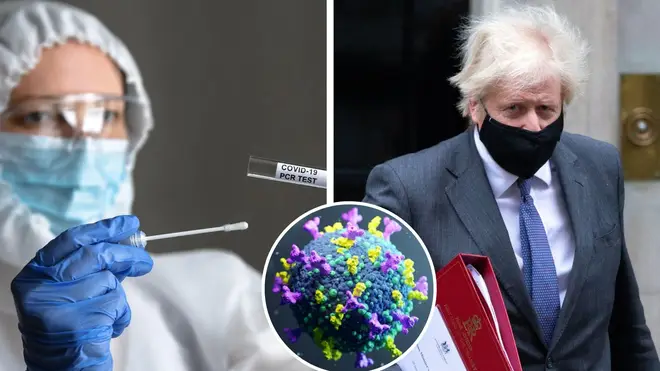
Lewis Goodall 10am - 12pm
28 November 2021, 17:21 | Updated: 28 November 2021, 22:27

A third case of the Omicron variant has been detected in the UK - as members of a church congregation and a KFC outlet's customers were told to get tested.
Health officials detected the variant in an individual who is no longer in the country, who tested positive after arriving here.
It is thought their movements are linked to travelling to southern Africa.
The newest case has been linked to the Westminster area and the UK Health Security Agency (UKHSA) will carry out targeted testing at places it believes the individual visited.
Meanwhile, targeted testing is under way in Essex, where another case was found. Anyone who visited a KFC in Brentwood High Street on November 19 between 1pm and 5pm is asked to get a PCR test, as is anyone who attended Trinity Church in Pilgrims Hatch on November 21.
Speaking of the third case, Dr Jenny Harries, chief executive of UKHSA, said: "Our advanced sequencing capabilities enable us to find variants and take rapid action to limit onward spread.
Read more: Compulsory mask wearing and travel testing come into force in England on Tuesday
Read more: Reaction to Omicron 'totally over the top', says South Africa top doc
"It is very likely that we will find more cases over the coming days, as we are seeing in other countries globally and as we increase case detection through focused contact tracing.
"We are continuing our efforts to understand the effect of this variant on transmissibility, severe disease, mortality, antibody response and vaccine efficacy.

Medical expert reassures LBC on danger of Omicron variant
"It's critical that anyone with Covid-19 symptoms isolates and gets a PCR test immediately.
"Vaccination is critical to help us bolster our defences against this new variant - please get your first, second or booster jab without delay.
"Wear a mask in crowded places, including public transport and shops, to ensure we all help break the chains of transmission and slow the spread of this new variant."
Read more: Omicron: Symptoms, cases, and what we know so far
Read more: Universities fuelled Omicron outbreak, says South African Health Minister
A G7 summit will be "urgently" held on Monday to discuss Omicron.
It comes after the Government announced new travel restrictions, self-isolation rules and compulsory face mask wearing to mitigate any spread of the Omicron variant while scientists race to understand more about it.
There are fears about its ability to reinfect people and whether it reduces the effectiveness of vaccines.
Boris Johnson, ahead of announcing new measures on Saturday, said that while Omicron "might, at least in part, reduce the protection of our vaccines over time" the Government has "good reasons for believing they will provide at least some measure of protection".

'Mistake' to remove mask mandates during the summer
He then announced that anyone arriving in the UK will need to isolate, take a PCR test by the end of their second day here, and keep quarantining until they get a negative result.
Face masks will be compulsory in shops and on public transport, and anyone who comes into contact with a case of Omicron will need to go into isolation even if they are fully-vaccinated.
The measures do not constitute a form of lockdown and Mr Johnson said the measures would be reviewed in three weeks' time.
He also told a press conference he was confident Christmas would be better than last year's, when he introduced restrictions that ruined festive plans for millions when the fast-spreading Delta variant took hold.
Mr Johnson, who has urged people to get any jab they are eligible for - be it their first, second or booster dose - said on Saturday: "As always, and I must stress this, as always with a new variant, there are many things that we just cannot know at this early stage.
"But our scientists are learning more hour by hour, and it does appear that Omicron spreads very rapidly, and can be spread between people who are double vaccinated."
Government experts are also looking into whether boosters should be given to all adults and whether to offer second doses to those aged 12 to 15.